ISO Tank containers are dedicated on the transport of bulk liquid products and are built under ISO (International Organization for Standardization) standards and designed on a type-of-substance basis, made of stainless steel alloy and surrounded by protective layers.
The ISO tank container is equipped with a system of valves on top and on the bottom to allow the load and unload operations in a safe and clean way It is shaped like a cylinder and can carry between 21,000 and 40,000 liters of liquid.
These tanks are classified according to its building specifications and the accessories attached to it. This classification determines the type of product that can be transported. The supporting frame is intended to protect the tank, as well as to facilitate stowage, securing and same handling as an ISO container for multimodal transportation.
If handled properly, the frame is capable of withstanding the stresses to which a fully loaded container is subjected.
What does ISO in ISO Tank stands for?
ISO certification is recognised worldwide as a commitment to continuous improvement in all areas of operations. For organisations, the standard helps ensure that business processes meet the needs of their customers and all regulatory agencies.
For ISO Tank containers, tanks are manufactured in accordance with international regulations and must be inspected and certified. All ISO Tanks must comply with regulations such as size, strength and durability and must be fit for their primary purpose.
ISO Tanks include a Container Security Certificate (CSC) issued by the manufacturer. Official Inspections are carried every 5 and 2.5 years to certify the optimal condition of the ISO tank according official standards. On top of that after each use ISO tanks are revised to guarantee that the equipment is in good transport condition.
What liquids can be carried by an ISO Tank?
All portable liquids, non-hazardous and hazardous liquids, including corrosive, flammable, toxic and explosive liquids, and food grade classified to name a few:
- Gasoline/Diesel
- Dairy products
- Liquefied sugars
- Alcoholic and Non-Alcoholic Beverages
- Hydrogen Peroxide
- Sulphur Acid
- Liquid Food Products
- Heating oil and Vegetable oils
- Liquid Resins
- Chemicals
- Petrochemic
Perks of the ISO Tank
- Cost-effectiveness: ISO tank containers are easily moved to and from ship to rail or to trucks, and with standard handling equipment. This reduces handling and storage costs.
- Immediate availability: ISO tanks are present at major ports around the world and may provide a regular, safe and quickly available transport option compared to other liquid transport options.
- Temperature control:Controlled Temperature ISO Tanks can maintain a specific temperature for temperature-sensitive cargo.
- Reliability:Most are made of stainless steel alloy which has a natural resistance to corrosion, and tank lining. The containers can resist pressure and temperature variations.
- Stackable:Increases ease of handling and storage.
- Security:ISO tanks are designed to meet specific criteria according to the substance they will be carrying.
- Environmentally Sustainable: ISO tank is a very sustainable transport mode, it reduces product manipulation, reduces leakage risk, reduces use of non re-usable packings such as drums, IBC’s , and do avoid the problems of waste disposal and safety of other liquid transport systems such as flexibags.
This container eliminates the risks that can arise when transferring liquids from one vessel to storage facilities and provides an extremely safe, cost-effective and viable means of transport.
Once emptied, the tank is transferred to a certified washing station, thoroughly cleaned and inspected to get it ready for the next loading. Although the tanks have a fairly uniform external appearance, construction materials, internal coating and fittings vary.
For more information on cargo transport with ISO Tank contact our dedicated team at: mail@noatummaritime.com
